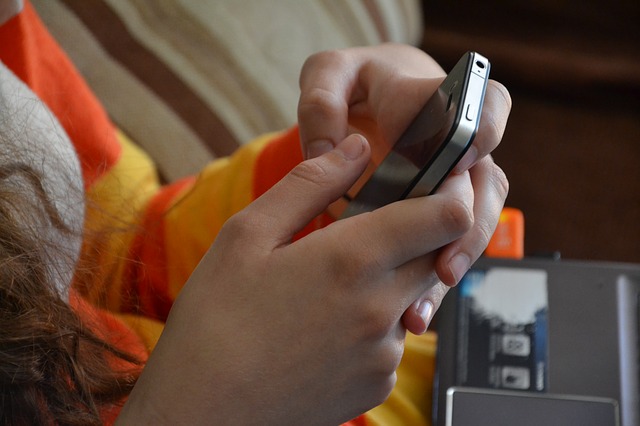
– by Amanda Barnes Cook
I am a better parent for having read articles and books (see here, here, here, and here) about the importance of resisting the distraction of my smartphone while I’m with my kids. It is true that smartphones are an invitation to distraction like nothing before, and I am a more connected and effective parent when I am mindful about my technology use. But these discussions are marked by a startling lack of rationality, even as they create one more measure through which parents are made to feel guilty. I’ve often heard people complain with disdain about “parents these days” ignoring their children while tethered to devices. I’ve seen posts on social media about “how sad” it is when you see a parent using a phone while at the park with their child. Parents know that their technology use is subject to constant judgment.
Disconnected time with loved ones is vital. We should be mindful about creating distraction-free space in our lives. My concern is with the idea that there is something harmful about ever using mobile devices in front of children. My concern is that the judgy obsession with avoiding distracted-by-devices parenting is creating a mandate that parents can never be disconnected from their children.
Parents have always been distracted. There has never been a time in which parents remained constantly engaged with children throughout their waking hours. Complete avoidance of distracted parenting is impossible. Even if it’s possible to shun mobile devices, parents have a variety of other tasks that tear them away from children: cooking, cleaning, working, showering, even using the toilet. This is healthy. No parent can be fully connected all the time.
When I was young, my parents engaged in a steady stream of tasks that required ignoring us kids. Tasks like reading the newspaper, cooking, reading the mail, writing a grocery list, reading

directions on a car trip, finishing work that didn’t get done during the workday, and paying bills all created space in the day when my parents were unavailable to me. And it wasn’t only chores that disconnected us, but also social things like talking on the phone, chatting with a friend or neighbor who stopped by, enjoying a cup of coffee, and going shopping. I have a vivid memory of rolling around whining on the floor of our dining room while my mom talked on the phone with my aunt. She didn’t hang up because of my antics, she kept talking—as well she should have.
This type of disconnection between parent and child is unavoidable. It’s life. It taught me patience and gave me the gift of boredom.
All of this applies to parenting in an age of technology, too, but there is one big difference: all of those tasks that disconnected my parents from me can now be completed on a smartphone. The phone is our newspaper, our mail, our work, our connection to friends, our bank, and our stores. Before parents sat at the park on their smartphones, they sat at the park reading the paper. From the outside, parents today seem to spend an inordinate amount of time “distracted on the phone,” when really what has mostly changed is the medium.
I do think it’s important to be mindful about technology use. I want my children to know that they can get my attention if they want to. I don’t want them to feel that they are competing with an Apple product. I also want them to show them—with my actions, not my words—that the world is a beautiful place and that interaction with people, animals, nature, and books is exciting, and that there is balance and serenity to be found in time without devices.
But parents will be using technology while they are with their children. The question is not whether to use devices, but how to do so in a way that is respectful of the needs of one’s children.
Here are some strategies for respectful use of technology that have been helpful to me:
- Be honest. When I’m with my kids and I need to use my phone, I tell them what I am doing and how long it should take. “I need to check my messages, I will be done in a few minutes.” If there’s no specific task that needs to get done, but I need a break, I am honest: “I need a break, I am going to use my phone for ten minutes, then we can play.”
- Carve out time. At our house, I minimize technology use from school pickup until the kids are asleep. Most days I do use my phone a few times during this period, but I try to keep it short and transparent. And phones are never at the table during meals or with me while I am engaged in routines like the morning or bedtime routine. It is important that kids can count on some time each day—especially caregiving times like meals and bedtime—to have full our attention.
- Banish guilt. When I am at the park on a bench and my kids are playing happily without me, I Facebook and email without shame. Guard against guilt. Nothing is gained by using devices but feeling guilty about it. If I had lived a few decades ago, I would’ve been at the park with a book instead.
- Homes for devices. I was uncomfortable when my baby became a toddler and started carrying my phone to me whenever I left it behind. Like he thought the phone was an appendage. So we created places in our house for our devices to live when they aren’t in use. The devices are accessible, but the message is clear: Mommy can, in fact, live without a phone on her person.
- Give the gift of boredom. It is not our job as parents to remain connected with our kids all the time. Even if that were possible, it would not be healthy for the parents, who need breaks and time to get things done, or for the children, who need to learn patience and independent play.
Madga Gerber wrote:
Set aside predictable, regular times to give full attention without being distracted by other concerns while also creating a safe, familiar place for baby to spend time playing alone….Whenever you care, do it absolutely with full attention. If you pay half attention all the time, that’s never full attention. Babies are then always half hungry for attention.
This advice is sound, and it is no less achievable when the “other concerns” are on devices. The goal is not full attention all of the time; the goal is not no devices all of the time. Let’s seek a moderate approach that meets the needs of parents and children.
What strategies have you found helpful in achieving respectful and moderate technology use?

This is great. Thanks for talking about balance… I have addressed my phone usuage recently to come up with balance also. I do all banking and shopping online too, but moat of my online time is spent talking to other mummies I admire, or reading parenting articles (like this one) which is helpful to my parenting, but not when it gets in the way of parenting. I now try to set aside 2-3 10-15minite blocks during the day where I sit down with a cuppa and use my phone, then I put it in its spot until I need to use it. In between there are always phone callsa and mesaages and photos between me and my husband, but they know what I am doing and then I am done. When I have to do things that take longer, like shopping online, I try to do it when they r in bed, or when they r doing something I know will entertain them and then limit myself to a reasonable ammount of time. My husband also doesn’t like to be ignored so in the evenings we also have a no device rule so we pay attention to each other. It does mean I miss out on some things online, and I have over 100 tabs open on my phone of articles I will get to, but it’s a balance.
I love this, Belinda. And it’s so true that we need to carve out device-free time for our partners, too, not just our kids. Balance (and a plan) makes it possible!
Please excuse typos…